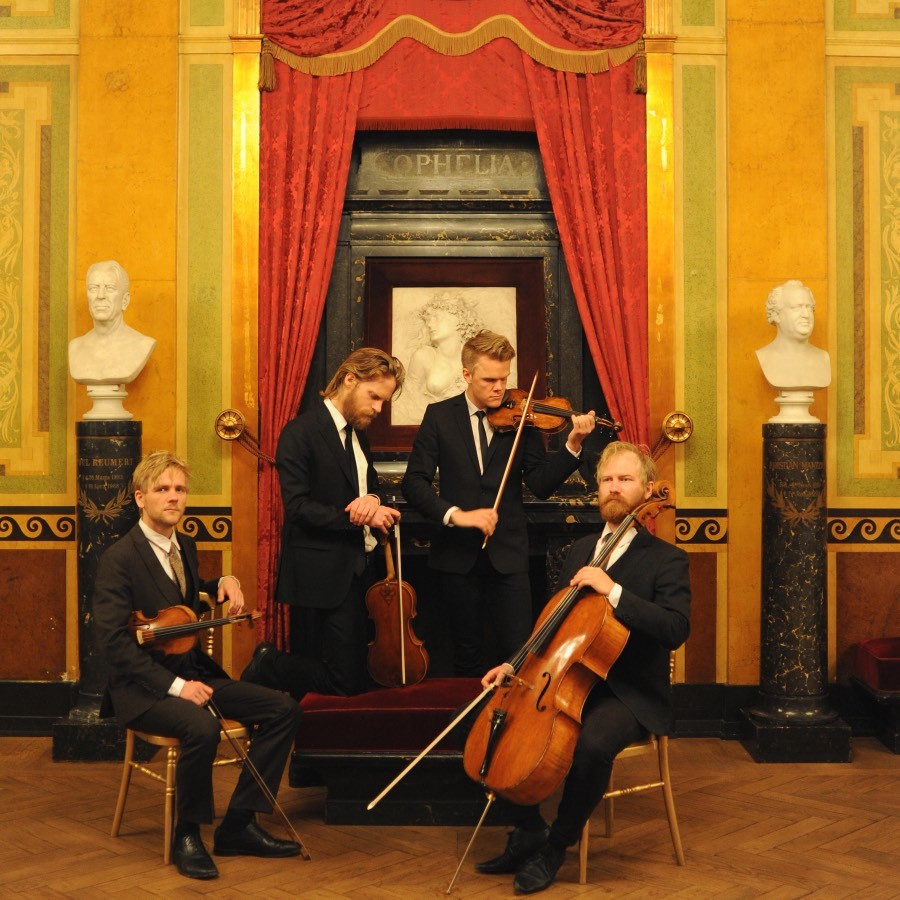Melancholy jars one out of sociable music in Danish Quartet’s Beethoven cycle

In Beethoven’s Opus 18–his first published string quartets, in effect his final exam in the genre made famous by Haydn and Mozart—the young firebrand composer took it easy on his listeners, writing stimulating, sociable music for home players, mostly saving the ground-breaking, radical stuff for later.
In Sunday’s Chamber Music Society concert at Alice Tully Hall, the second of six in the Danish String Quartet’s complete Beethoven quartet cycle, the Scandinavian visitors also took it easy—mostly.
No storms of passion ruffled the waters in this elegant rendition of Nos. 4, 5, and 6, the final three of Beethoven’s set, even in the piece in C minor, the incendiary key of the “Pathétique” Sonata and Fifth Symphony.
Instead, the quartet cyclists—Frederik Øland and Rune Tonsgaard Sørensen, violins: Asbjørn Nørgaard, viola; Fredrik Schøyen Sjölin, cello—refused to get ahead of themselves, delivering these fine entertainments as if Beethoven-the-thunderer never existed. (For that individual, one had to wait until the next concert in this series, the “Razumovsky” set of Op. 59.)
On Sunday, an abundance of Classical-style pleasures—silken or glowing tone, acute musical intelligence, subtle weaving of parts, immaculate intonation and a compelling sense of line and direction—would have to do.
That is, until the last movement of the last piece in the set, No. 6 in B-flat major. In Op. 18, as in his early sets of sonatas and trios, Beethoven saved his most innovative ideas till the end.
The first three movements of No. 6 certainly have their shadows and moments of doubt, but nothing prepares the listener for “La Malinconia,” the title Beethoven wrote over the finale’s slow introduction. In these hesitant, “melancholy” bars, the composer seems suddenly to lose his way, as his older self will at times in the late quartets. The suffering artist behind the entertainer is unexpectedly revealed.
On Sunday, the Danes captured the melancholy moment with hold-your-breath intensity—an effect heightened by the entire program of blithe music that came before it–and its shadow hung over the Allegretto finale (with interruptions by La Malinconia) until the final, desperate prestissimo dash to the end.
To single out this remarkable turn of events—well-known to Beethoven fans, but still stunning in a superb performance like this one—is to take nothing away from the rest of Sunday’s thoughtfully planned and executed program.
The Danish quartet is performing the works in the exact order in which they were written, which involved a slight shuffling of Op. 18. It so happens that the order that came up for Sunday—No. 5 in A major, No. 4 in C minor, No. 6 in B-flat major—forms an arc of moods, from a masterpiece of understatement to something a little zingier (C minor, remember?) to a questing work of painful honesty.
Sunday’s performance of No. 5 was distinguished by an especially poised yet lively first movement, honeyed tone in the Menuetto and the Andante cantabile (a zesty set of variations), and a finale whose wayward scurryings were handled with humor and polish.
Violinist Tonsgaard Sørensen took the first chair for the following two quartets, leading the C minor charge in No. 4, while Øland soared in the major-key second theme on second violin. A buoyant Scherzo, a Menuetto of Schubertian grace and major-minor chiaroscuro, and a biting “gypsy”-style rondo completed the salty work in style.
With an understanding that No. 6 was going to be special, the players dug a little deeper with their bows in the first movement, without forcing the issue, and made the music rhythmically alive. A whispery, subtly inflected Adagio and a light, pointed Scherzo set the scene for the revelations of La Malinconia and the shadowy, interrupted finale.
Rather than leave the audience on such a musically agitated note, the group responded to the enthusiastic applause with a mellow encore—their own richly harmonized arrangement of “Underlige Aftenlufte,” a hymn-like song by their countryman Carl Nielsen.
The Chamber Music Society’s Beethoven quartet cycle with the Danish String Quartet runs through February 18. The three “Razumovsky” quartets, Op. 59, will be performed 7:30 p.m. Tuesday at Alice Tully Hall. chambermusicsociety.org; 212-875-5788.


